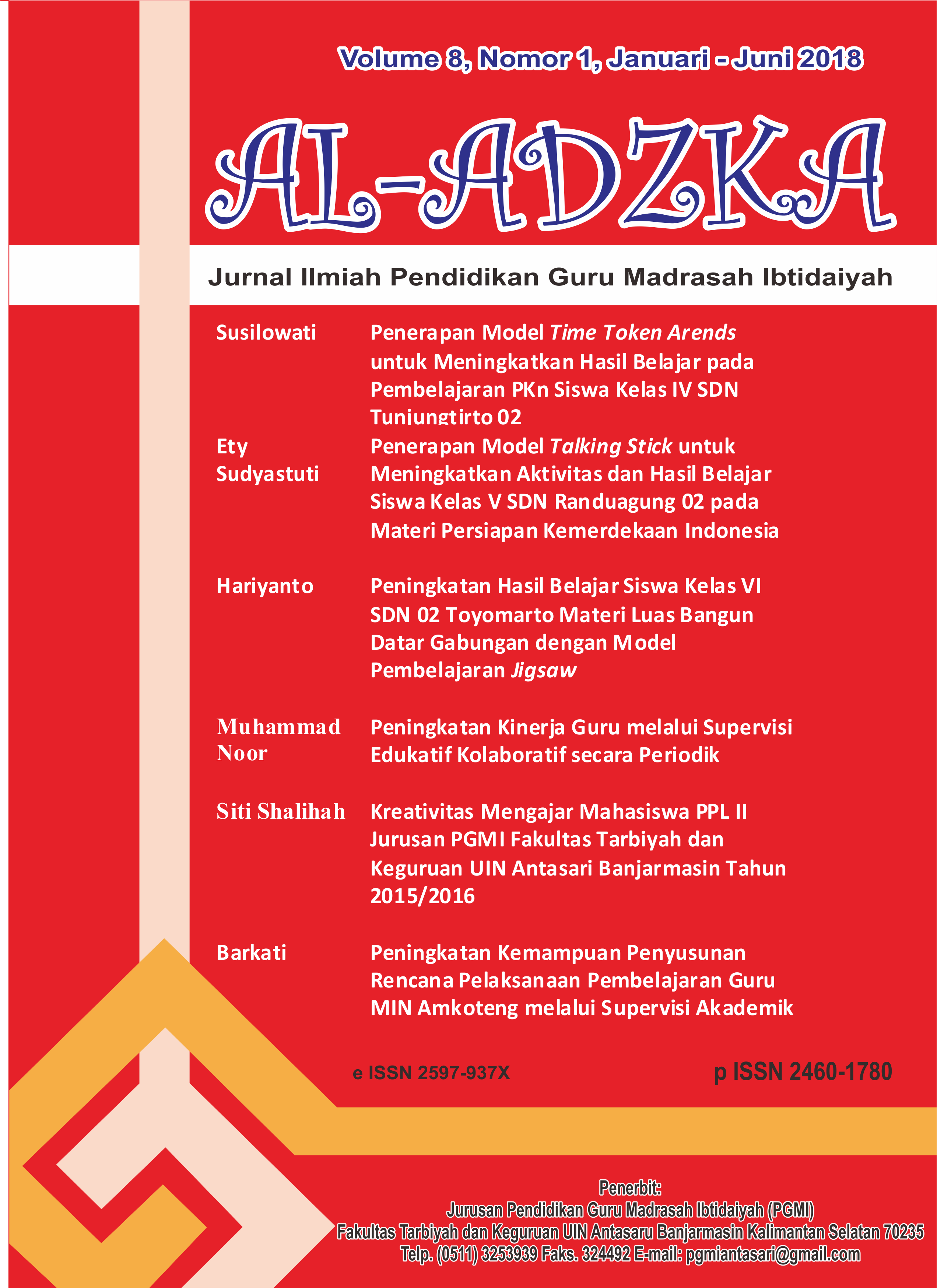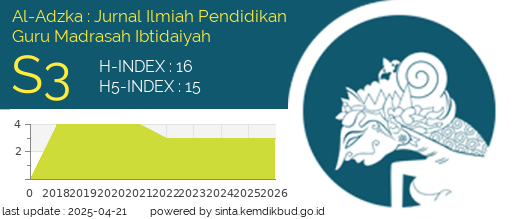Kreativitas Mengajar Mahasiswa PPL II Jurusan PGMI Fakultas Tarbiyah dan Keguruan UIN Antasari Banjarmasin Tahun 2015/2016
DOI:
https://doi.org/10.18592/aladzkapgmi.v8i1.2178Keywords:
creativity, teaching practice, college studentAbstract
The study aims to determine the creativity of teaching students PPL II PGMI FTK UIN Antasari Year 2015/2016 and the factors that influence it. This type of research is field research (field research) with qualitative approach. The design used in this research is descriptive research. Objects in this research is the creativity of teaching students PPL II Faculty of Tarbiyah and Teacher Training Program PGMI Antasari Banjarmasin Year Ajisi 2015/2016. Subjects in this study were Students PPL II force 2012 Department of PGMI Faculty of Tarbiyah and Teacher Training UIN Antasari Banjarmasin located in MI Al Istiqamah, amounting to ten people. Techniques of data collection using observation, interviews, and documentation. Data analysis technique used is descriptive qualitative. The result of the research shows that the creativity of teaching students of PPL II UIN can be seen from the variation of active learning strategy and the variation of media used. While for the source of learning, PPL II students are still many who only use learning resources in the form of textbooks. Factors that affect the creativity of teaching students PPL II, including teacher candidate factors consisting of educational background and learning experience, facilities and learning resources, as well as conductive environmental conditions.References
Agung, Iskandar, Meningkatkan Kreativitas Pembelajaran bagi Guru. Jakarta: Bestari Buana Murni, 2010
Asmani, Jamal Ma’mur, Tips Menjadi Guru yang Inspiratif, Kreatif, dan Inovatif. Jogjakarta: DIVA Press, 2010
Asril, Zainal, Micro Teaching Disertai Dengan Pedoman Pengalaman Lapangan. Jakarta: Raja Grafindo Persada, 2007
Djamarah, Syaiful Bahri, Guru dan Anak Didik dalam Interaksi Edukatif. Jakarta: Rineka Cipta, 2010
Januari, Didik, dan Murtafi’atun, Trik A-Z Menjadi Guru Kreatif. Yogyakarta: Indoliterasi, 2015
Majid, Abdul, Pembelajaran Tematik Terpadu. Bandung: PT Remaja Rosdakarya, 2014
Mulyasa, H.E, Pengembangan dan Implementasi Kurikulum 2013. Bandung: PT Remaja Rosdakarya, 2013, Cet. Ke-3
Nasution, Teknologi Pendidikan. Jakarta: PT Bumi Angkasa, 2008
Nazir, Moh.,Metodologi Penelitian. Bogor: Ghalia Indonesia, 2011, Cet ke-7
Sanjaya, Wina, Strategi Pembelajaran Berorientasi Standar Proses Pendidikan. Jakarta: Listafariska Putra, 2008
Slameto, Belajar dan Faktor-faktor yang Mempengaruhinya. Jakarta: Rineka Cipta, 2003
Sugiyono, Metode Penelitian Pendidikan Pendekatan kuantitatif, Kualitatif, dan R&D. Bandung: Alfabeta,2012
Sukmadinata, Nana Syaodih, Metode Penelitian. Bandung: PT. Remaja Roesdakarya, 2010
Supatian, Guru Sebagai Profesi. Jakarta: Hikayat, 2003
Talajan, Guntur, Menumbuhkan Kreativitas dan Prestasi Guru. Yogyakarta: LaksBang PRESSindo, 2012
Tim Redaksi Nuansa Aulia, Sistem Pendidikan Nasional (SISDIKNAS). Bandung: Bestari Murni, 2008.
Tim PPL, Pedoman Pelaksanaan PPL Fakultas Tarbiyah dan Keguruan, IAIN Antasari Banjarmasin, 2012.
Uno, Hamzah, Model Pembelajaran Menciptakan Proses Pembelajaran yang Kreatif dan Efektif. Jakarta: Bumi Aksara, 2008
Wijaya, Cece, dan A. Tabrani Rusyan, Kemampuan Dasar Guru dalam Proses Belajar Mengajar. Bandung: Remaja Rosda Karya.
Downloads
Published
How to Cite
Issue
Section
License
Authors who publish with this journal agree to the following terms:
- Authors retain copyright and grant the journal right of first publication with the work simultaneously licensed under a Creative Commons Attribution 4.0 International that allows others to share the work with an acknowledgement of the work's authorship and initial publication in this journal.
- Authors are able to enter into separate, additional contractual arrangements for the non-exclusive distribution of the journal's published version of the work (e.g., post it to an institutional repository or publish it in a book), with an acknowledgement of its initial publication in this journal.
- Authors are permitted and encouraged to post their work online (e.g., in institutional repositories or on their website) prior to and during the submission process, as it can lead to productive exchanges, as well as earlier and greater citation of published work.












